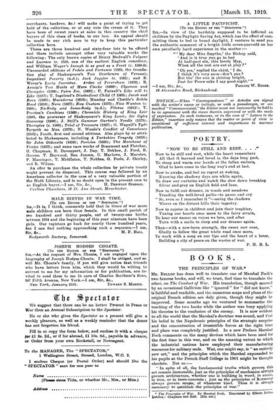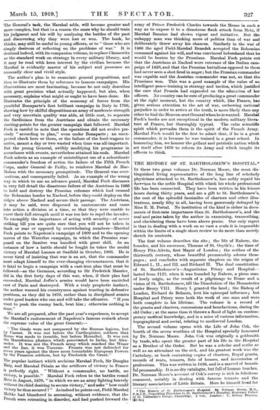BOOKS.
THE PRINCIPLES OF WAR.*
Ma. EKLLOO has done well to translate one of Marshal Foeh's two famous books, and will, we trust, find time to translate the other, on The Conduct of War. His translation, though marred by an occasional Gallicism like " ignored " for "did not know," is faithful and readable, and the numerous maps and plans of the original French edition are duly given, though they might be improved. Some months ago we ventured to summarize the teaching of the two books while the author was busy applying his theories to the confusion of the enemy. It is now evident to all the world that the Marshal's doctrine was sound, and that his belief in the Napoleonic principles of the strategic surprise and the concentration of irresistible forces at the right time and place was completely justified. In a new Preface Marshal Foch comments on the many devices which have been used for the first time in this war, and on the amazing extent to which the industrial nations have employed their manufacturing resources for military ends. War, one might say. is " an entirely new art," and the principles which the Marshal expounded to his pupils at the French Staff College in 1901 might be thought obsolete. Not so :- " In spite of all, the fundamental truths whioh govern this art remain immutable, just as the principles of mechanics always govern architecture, whether one is budding in wood, in stone, in iron, or in ferro.conorete; just as the principles of hirmony always govern mode, of whatever kind. Thus it is always necessary to astablieh the principles of war."
• The Prwiples of War. By Mamba! gosh. Tramlarad by Blake Bell. Lotion; Chapman and 11M1. lila. Oct.]
The General's task, the Marshal adds, will become greater and more complex, but that i e a reason the more why he should train his judgment and his will by analysing the battles of the past and discovering why they were loot or won. The book, he thinks, may still be useful to young officers, or to " those who are simply desirous of reflecting on the problems of war." It is destined indeed, with its companion volume, to replace Clausewitz as the etandard work on strategy in every military library, and it may be read with keen interest by the civilian because the Marshal is evidently master of his subject and possesses an unusually clear and vivid style.
The author's plan is to enunciate general propositions, and then to illustrate them by reference to famous campaigns. His illustrations are most fascinating, because he not only describes with great precision what actually happened, but also, when necessary, explains•what might or ought to have been done. He illustrates the principle of the economy of forces from the youthful Bonaparte's first brilliant campaign in Italy in 1796, showing how by skilful dispositions an army of moderate strength and very uncertain quality was able, at little cost, to separate the Sardinians from the Austrians and obtain the necessary starting-points for the greater campaign that followed. Marshal Foch is careful to note that the operations did not evolve pre- cisely " according to plan," even under Bonaparte ; an unex- pected check here or there, or the failure of the food-wagons to arrive, meant a day or two wasted when time was all.important. But the young General, swiftly modifying his programme in accordance with events, nevertheless attained his ends. Marshal Foch selects as an example of unintelligent use of a subordinate commander's freedom of action the failure of the Fifth French Corps, under General de Frilly, to reinforce Marshal de. Mac- Mahon with the necessary promptitude. The General was over- usurious, and consequently failed. As an example of the wrong way in which to use an advance guard, Marshal Foch discusses in very full detail the diaastrous failure of the Austrians in 1866 to hold and destroy the Prussian columns which had crossed the Bohemian border to Nachod, before they could deploy on the ridges above Nachod and secure their passage. The Austrians, it may be said, were dispersed in cantonments and came into action a division at a time, so that they were unable to exert their full strength until it was too late to repel the invader. To exemplify the importance of acting with security—of never striking till you are quite sure that you will not be taken in flank or rear or opposed by overwhelming numbers—Marshal Foch points to Napoleon's campaign of 1809 and to the opening moves of the Waterloo campaign, in which the Prussian rear- guard on the Sambre was handled with great skill. As an instance of how a battle should be fought he takes the model victory of Marshal Lames at Saalfeld in October, 1806. He is never tired of insisting that war is an art, that the commander must adapt himself to the ever-changing circumstances, that it is fatal to begin a campaign with a cast-iron plan that must be followed—as the Germane, according to Sir Frederick Maurice did in the first forty days of this war, when, if their plan had succeeded, Marshal Joffre's armies would have been encircled east of Paris and destroyed. With a truly prophetic instinct, the author warned his countrymen against trusting in defensive positions, as they did in•1870, rather than in disciplined armies under good leaders who can and will take the offensive. " If you want to push the enemy back, beat him ; otherwise nothing is done."
We are all prepared, after the past year's experience, to accept the Marshal's endorsement of Napoleon's famous remark about the supreme value of the great General:-
" The Gauls were not conquered by the Roman legions, but by Caesar. It was not before the Carthaginian soldiers that Rome was made to tremble, but before Hesmibel. It was not the Macedonian phalanx which penetrated to India, but Alex- ander. It was not the French army which reached the Weser and the Inn, it was Tammuz. Prussia was not defended for wee years against the three most formidable European Powers by the Prussian soldiers, but by Frederick the Great."
The popular instinct which acclaims Marshal Foch, Sir Douglas Ifaig, and Marshal Pertain as the artificers of victory in France je perfectly right. " Without a commander, no battle, no victory, is possible." Marshal Foch refers to the battles round Metz in August, 1870, " in which we see an army fighting bravely without its chief desiring to secure victory," and asks " how could victory be thus secured?" As indeed he points out, Field-Marshal Moltke had blundered in assuming, without evidence, that the French were retreating in disorder, and had pushed forward the army of Prince Frederick Charles towards the Meuse is such a way as to expose it to a disastrous flank attack from Metz, if Marshal Bazaine had shown vigour and initiative. But the unhappy man was thinking more of politics than of war and deliberately threw away his chances. Similarly in the war of 1866 the aged Field-Marshal Benedek accepted the Bohemian command against his will, and was convinced beforehand that he would be beaten by the Prussians. Marshal Foch points out that the Austrians at Nachod were veteran of the Italian cam- paign of 1859, and that the Prussian battalions opposed to them bad never seen a shot fired in anger; but the Prussian commander was capable and the Austrian commander was not, so that the Prussians won. This was a good example of the value of an intelligent peace-training in strategy and tactics, which justified the care that Prussia had expended on the education of her officers. No country can be sure of producing a great commander at the right moment, but the country which, like France, has given serious attention to the art of war, eschewing national prejudice in order to arrive at the truth, is more likely than any other to find the Heaven-sent General when he is wanted. Marshal Foch'e books are not exceptional in the modern military litera- ture of France, but thoroughly typical. The calm scientific spirit which pervades them is the spirit of the French Army. Marshal Foch would be the first to admit that, if he is a great commander, it is because he was trained in a great schooL In honouring him, we honour the gallant and patriotic nation which set itself after 1870 to reform its Army and which taught its officers to think.







































 Previous page
Previous page